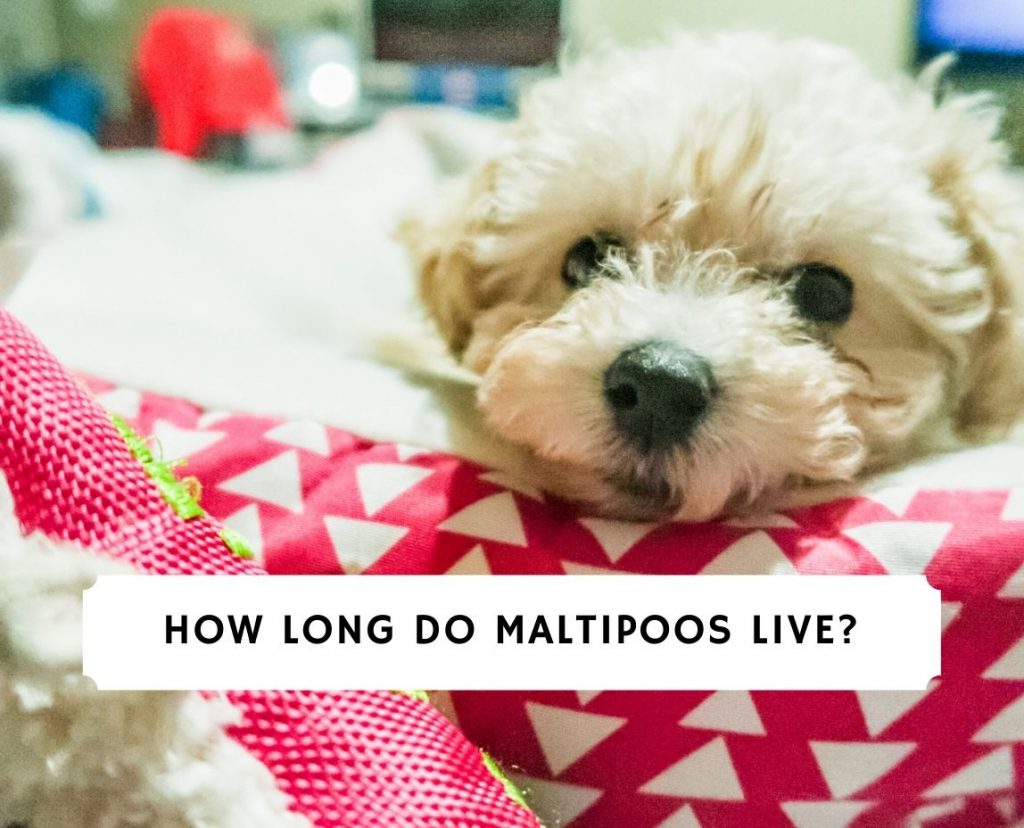
As everyone knows, committing to a dog means adding a new member to your family for many years. Maltipoos are adorable little dogs and can live very long lives when given the proper care. So what is the typical maltipoo lifespan?
Ensuring that your dog has access to regular health care visits, a proper diet, and daily exercise can keep your dog healthy, happy, and extend his lifespan. Breeders who check for health or genetic issues can also positively affect your Maltipoo’s lifespan, so it is essential to find a reputable breeder when adopting a puppy.
The average Maltipoo lifespan is 12-15+ years. These are small dogs that are considered to have very few health issues. To truly understand your dog and its expected lifespan, you need to explore both the Maltese and Poodle breeds.
This article will help you understand the basics of what contributes to a Maltipoo’s lifespan and what you should avoid keeping your dog safe and healthy for a long time. Specifically, we will explore breeding information, common factors that contribute to a Maltipoos lifespan, and common health issues that Maltipoos face.
Factors That Affect a Maltipoos Lifespan
Many different factors contribute to a dog’s health and lifespan. Some of these factors can be mitigated through proper care while others are inevitable. Below we will discuss some of these major factors and what you can do to help extend the life of your own Maltipoo.
Breeder Genetic and Health Testing
If you want a healthy dog that will live a long time, it is absolutely crucial to adopt a puppy from a reputable breeder. A good breeder will conduct genetic and health testing on their parent dogs before breeding them to prevent hereditary diseases from being passed down to puppies.
When choosing a breeder, make sure they conduct these health tests and ask for the results before committing to purchasing a puppy from them. Typically, puppy mills do not conduct health or genetic tests, which may result in their puppies growing into adult dogs with health issues. These health issues can drastically reduce the lifespan of your Maltipoo.
Size
To truly understand your Maltipoo’s lifespan, you will need to look at Poodles and Maltese dog breeds individually. Understanding the size and lifespan of Malteses and Poodles can help you understand the lifespan of your Maltipoo.
When breeding Maltipoos, breeders choose between two sizes of Poodle: Miniature Poodles or Toy Poodles. Typically, smaller dogs live longer than larger dogs, so the Poodle parent’s size when breeding your puppy could slightly affect its lifespan.
Miniature Poodles are slightly larger than Toy Poodles, on average, so this size difference could affect the lifespan of your Maltipoo. However, the difference is not too drastic and typically varies by about a year.
Malteses are easier to understand because they are all approximately the same size and adhere to a purebred standard. On average, a Maltese will have a lifespan of about 12-15 years.
Maltipoos can vary in size from about 8 to 14 inches tall and from around 5 to 20 pounds in weight. Scientists have figured out that every 4.4 pounds of body mass reduces a dog’s lifespan by about 1 month. This is because larger dogs grow faster and are exposed to age-related illnesses earlier in life. Luckily for Maltipoos, size and weight doesn’t vary too drastically, so the average lifespan only varies by about a year based on their size.
Hybrid Vigor
For new dog owners, hybrid vigor may be a new term to understand. Hybrid vigor refers to the health and other benefits gained by crossing two unrelated purebred dog breeds.
Being a cross between a Poodle and a Maltese, Maltipoos are considered to have hybrid vigor. This means that these dogs are less likely to inherit genetic health problems from their purebred parent dogs. This is because purebred dogs are typically bred to the same bloodlines and experience the same health issues.
Breeding dogs that have the same bloodline can contribute to the passing down of genetic ailments. By introducing a new bloodline to the mix, the likelihood of these genetic problems is decreased.
Therefore, the amount of each parent dog’s genetics in a puppy can contribute to their likelihood of developing the common diseases of that breed. This means that some generations of Maltipoo are less likely to develop diseases than others.
Therefore, if you want to adopt a Maltipoo with the longest possible lifespan, you should get an F1 generation. This means that they are the first-generation offspring (produced by breeding a purebred Maltese with a purebred Poodle) which always reduces the number of hereditary illnesses passed down.
Other Maltipoo Life Expectancy Factors
Some other factors, such as general health and wellness, contribute to a Maltipoo’s lifespan. These are things that you can do to ensure that your dog lives its longest and healthiest life.
- Regularly bring your Maltipoo to the veterinarian. With regular vet visits, your vet can detect any health problems that your dog may be developing and start preventative measures against worsening conditions. Additionally, bringing your Maltipoo to the veterinarian will ensure that your dog is up to date with all vaccinations and will reduce the chance of him catching diseases.
- Feed your Maltipoo nutritious food. The market for dog food is huge, but, unfortunately, many brands include unhealthy fillers in their foods. Make sure to choose a dog food with a healthy balance of proteins, carbs, and healthy fats to ensure your dog is getting all the nutrients it needs to stay healthy. Check out our article on “Best Dog Food for a Maltipoo” to choose the right food for your dog. If you think your dog may have some deficiency in its nutrition, you can also seek out supplements to help.
- Exercise your Maltipoo regularly. Maltipoos are small dogs, so they do not require huge amounts of exercise. That being said, you do need to ensure that your dog does get some exercise. Even just a daily walk can contribute to good heart health and prevent stiff joints in Maltipoos.
Common Maltipoo Health Issues
Maltipoos are a combination of Poodle and Maltese so, even with healthy parent dogs, some Maltipoos may develop health problems. Luckily many of the health problems that Maltipoos typically face are easily manageable.
When adopting a Maltipoo puppy from a breeder, make sure that you receive a health guarantee at the time of adoption. Additionally, please speak with the breeder about any health concerns you may have about your Maltipoo or its bloodline.
Overall, Maltipoos are considered very healthy dogs which is why they have a high life expectancy. They are not a breed known for having an abundance of health problems. That being said, there are still some health problems to look out for when caring for your Maltipoo.
- White Shaker Syndrome: This causes tremors and shakes throughout the body of the dog. White Shaker Syndrome typically occurs in younger dogs and often resolves itself. If it does not resolve naturally, a veterinarian can prescribe a small dose of medication to manage this syndrome.
- Epilepsy: This is a neurological condition in which the dog may lose consciousness, convulse, or experience sensory disturbance. This condition manifests in short episodes known as seizures. Epilepsy can be managed with medication. However, if you find your dog having seizures often or for long periods of time, it is essential to visit a vet to check for underlying causes.
- Patellar Luxation: This is extremely common in small dogs. Patellar luxation is a condition where the femur, patella, and tibia are not aligned properly. Based on the severity of the condition, this can be corrected with surgery without any lasting effects.
- Legg Calve Perthes Disease: Also very common in small dogs, this condition involves a degeneration of the femur bone, causing stiffness in joints. Often Maltipoos can live with Legg Calve Perthes with a small dose of pain medication. In more severe cases, surgery is required.
- Portosystemic Shunt (PSS): This is a condition where a problem develops with the vein that moves blood in and out of the liver, causing a toxic buildup. In minor cases, medication can be administered to absorb toxins. In more severe cases, surgery is required.
Frequently Asked Questions
If you’re thinking of adopting a Maltipoo, or just want to learn more about how long these pups live, read on to learn the answers to some of the most frequently asked questions.
What is the longest Maltipoo lifespan on record?
While Maltipoos usually live up to 15 years, the oldest Maltipoos on record have lived up to 17 years! This makes them wonderful pets for young children, as they’ll grow right along with your child.
What will shorten my Maltipoo’s life expectancy?
Several factors can shorten your dog’s lifespan. A few of these risk factors include:
- Obesity
- Poor nutrition
- Mental health issues
- Lack of proper vaccination
- Congenital diseases
- Heart disease
Once again, regular trips to the veterinarian are critical to the long-term health of your dog. Keep him up to date on vaccinations and speak with your vet about the proper diet for your Maltipoo.
How much exercise is healthy for my Maltipoo?
A quick walk or two each day should provide sufficient exercise for your baby. Maltipoos are small dogs, so they don’t need a ton of activity! Note, though, that exercise should be focused on your dog getting the activity he needs! Just running around the house chasing you may not provide enough exercise for your pup.
Should you have further questions about how to increase your dog’s lifespan with ample exercise, schedule a chat with your vet.
Conclusion for Maltipoo Lifespan – How Long Do Maltipoos Live
As you can see, many different factors contribute to the lifespan of a Maltipoo, which typically ranges from 12-15 years, Maltipoos are generally healthy dogs with long life expectancies.
However, there are things that you must do to continue to ensure your dog’s health, including taking your Maltipoo for regular veterinarian check-ups, feeding your dog nutritious food, and exercising your dog daily. These small things will have a big impact on your dog’s lifespan.
It is still important to note that, like all dogs, you cannot guarantee a full bill of health for their whole life. Maltipoos have several health issues that they are susceptible to. However, these issues are all easily manageable and will not drastically affect your dog’s lifespan as long as they are dealt with promptly and properly.
Remember, when adopting a Maltipoo, choose a reputable breeder. Good breeders will conduct health and genetic testing on their parent dogs that ensure that hereditary ailments are not passed down to your puppy. If you want to adopt a Maltipoo, prepare yourself for 12-15 years of love and affection.
For guides related to “Maltipoo Lifespan – How Long Do Maltipoos Live,” check out:
- Shih Poo vs Maltipoo: Dog Breed Comparison
- Best Types of Maltipoo Haircuts With Pictures
- How Much Does A Maltipoo Cost?
Garrett loves animals and is a huge advocate for all Doodle dog breeds. He owns his own Goldendoodle named Kona. In addition, he volunteers at the Humane Society of Silicon Valley, where he fosters dogs and helps animals. Garrett enjoys writing about Doodles and believes that dogs can teach humans more about how to live than humans can teach a dog.
Why Trust We Love Doodles?
At We Love Doodles, we’re a team of writers, veterinarians, and puppy trainers that love dogs. Our team of qualified experts researches and provides reliable information on a wide range of dog topics. Our reviews are based on customer feedback, hands-on testing, and in-depth analysis. We are fully transparent and honest to our community of dog owners and future owners.




